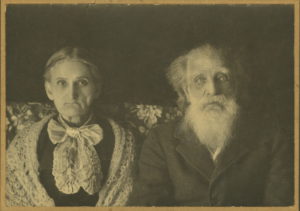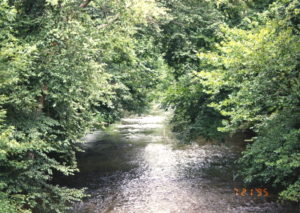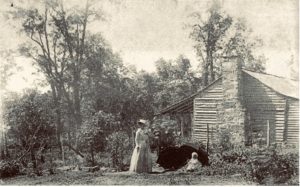
The Mullins family roots are almost all English. However, one Bavarian branch of the family immigrated to the U.S. from Frankenthal, Bavaria (today, southwest Germany), from an area known as the Rhenish Palatinate, on the west coast of the Rhine. Our ancestors George Freyschlag and his wife, Suzanne Fittig, were born in the former district of Frankenthal: George in Sandhoffen[i], and Suzanne in Grosskarlbach, a small town on the Eckbach river, where the couple would marry and have their first 6 children. Edward was born in 1814[ii]. In 1821 they moved to Mannheim, in order to secure a better education for the children.
George Freyschlag was a farmer, a millwright, and a distiller of whiskey[iii]. Unfortunately we have no history yet about his parents, nor about his adult life in Bavaria. In 1832, at the ages respectively of 47 and 41, George and Suzanne decided to emigrate to the U.S. We do not know what prompted the family to leave their homeland and make this difficult voyage. The reasons for European emigration were often economic; however family lore suggests that the Freyschlags were relatively wealthy when they traveled to America, and they even brought the family piano with them on Edward’s voyage across the Atlantic. Edward was reportedly an accomplished pianist. George and Suzanne had thirteen children, all born in Germany. At least three children did not live to adulthood. Their third child, and oldest son, was Edward Freyschlag (1814-1905), pictured above with his wife, Lucy Hawkins Freyschlag.
The Freyschlag family came to the United States in three stages, all documented on ship records. In 1833, George Freyschlag sailed from Le Havre to New York on the ship Poland with his oldest daughter and oldest son, Babette (Barbara) and Edward, arriving in May 1833[iv]. The following spring, Edward traveled back to Germany, and the next son, William Herman Freyschlag, sailed from Le Havre to New York, again on the Poland, arriving in May 1834[v]. The following year, Edward left Europe with his mother, and 9 siblings, sailing from Le Havre to New Orleans on Les Deux Soeurs, arriving at the Louisiana port on the February 9, 1835[vi]. The family then sailed up the Mississippi on the steamboat Veteran, to the White River, and on to Fayetteville, arriving the evening of March 9, 1835[vii], to what must have been a very emotional reunion with George, Babette, and Herman. Read more about the Freyschlag family in Our Bavarian Roots.

In those years, it was fairly common for German immigrants to the U.S. to move to the western frontier, as the Freyschlag’s did. In the spring of 1833, Fayetteville was a new town with just a few dozen families, having been founded just 4 years earlier when Cherokee Indians signed a treaty agreeing to leave the land and move further west. We can presume that a new, growing frontier town offered the best economic prospect for a millwright to construct a new mill that would be appreciated and patronized. At the time the family arrived in Fayetteville, there were no more than a few dozen families living in the new town. By 1840, Fayetteville had about 425 residents. George and his sons constructed their mill about 6 miles northwest of Fayetteville, on Clear Creek. It continued in operation for many years, and was the only mill in Fayetteville that was able to operate continuously through the years of the Civil War. Several members of the Freyschlag family, including George and Suzanne, were eventually buried on the grounds of the Mill, but their graves have been lost with time.

On October 12, 1840, Edward appeared in court to be granted U.S. citizenship[viii]. According to census records, he worked as a blacksmith for many years, in addition to milling and farming. On September 12, 1844, Edward married Lucy Hawkins, the youngest daughter of Jane Curle Walker and Dr. Martin Luther Hawkins. Edward moved on to the Hawkins family farm of 240 acres, where they remained for the remainder of their respective long lives. Edward was reportedly very successful at farming.
Edward served in the frontier service stationed at Ft. Gibson as a member of Captain Clarke’s company[ix]; one listing shows him as a Lieutenant Colonel, and as a bugler. In 1842, Edward was commissioned as a Colonel Commandant in the twentieth regiment, Washington County Militia, Arkansas. He might have served in the Mexican War, but we have not yet found military records to confirm this. He enlisted as a Confederate soldier in the summer of 1861 in Captain Rieff’s troop[ix,x], and was present at the Battle of Wilson’s Creek in Missouri on August 10, 1861, where his wife’s young brother, Martin Hawkins, was killed. He left the CSA after that battle, and does not appear to have reenlisted during the Civil War.
Edward’s brother Hermann served in the Mexican American War 1846-1848, under General Winfield Scott, and traveled on a campaign into Mexico. The soldiers would sing, “Green grow the rushes, oh…” from which the expression “Gringo” developed. Edward probably also served in the military during this war, but we have not found service records to confirm this.
In 1849, Edward traveled with four of his siblings to California for the gold rush. The expedition from Fayetteville to California departed the city on a snowy day in April 1849, comprising 120 people in 40 wagons, mostly pulled by oxen. Edward Freyschlag joined the expedition with two of his brothers, Christian and Henry, and two unmarried sisters, Barbara and Hermina[xi]. It does not appear that any Freyschlags found a significant gold claim, but Christian did well in the one business that was dependably profitable in California in 1850: he sold supplies to miners, as well as operating a boarding house with his sister Babette to provide food and comfortable lodgings for weary miners[i]. Christian remained in California, eventually starting a winery. but Edward had returned to Fayetteville by 1851. His third child, Jennie, was born in 1853.
Letters in the collection of Jane Walker Hawkins’s correspondence suggest that Edward’s return from California in 1851 was probably by steamer around the tip of South America to New Orleans. This was the most expensive, fastest, and safest form of travel from California to the Midwest. The least expensive, slowest, and most dangerous, was the overland route east from California, where one was subject to attack from Indians and thieves, as well as the difficult, arduous trek across the Wabash and Rocky Mountain chains. A middle course, in terms of cost and safety, was steamboat to Nicaragua, then overland across the isthmus, then steamboat to New Orleans. This was cheaper than the trip around South America, but exposure to tropical disease on the isthmus made this route less safe.
Continuing the family tradition, Edward grew hops to make his own beer. He was involved in at least one educational institution in Fayetteville, serving as one of the founders of The Far West Seminary, formed in 1844[xii]. He and Lucy continued farming for many years on the “Freyschlag Farm”. He sold 80 acres of land to the T.J. Mullins family in 1866 for $600. His daughter Sophia would marry T.J.’s son, William Madison Mullins, 5 years later
Several of the Freyschlag’s were involved in the Sawyer Female Seminary. An article in the Arkansas Democrat, 16 Feb 1849 mentions Edward’s sister, Hermenia Freyschlag, as Teacher of Vocal and Instrumental Music, and their brother, Herman, as a Dancing Master[xii]. Several others of the family would participate frequently playing violin or other instruments. Edward Freyschlag’s mother-in-law, Jane Walker Hawkins, boarded some of the girls who attended the school. The 1850 U.S. Census shows Flora Ridge living with Jane Hawkins; Flora was the daughter of the famous Cherokee Chief John Ridge, who was slain in 1839. It was after the slaying of Chief Ridge that Sophia Sawyer accompanied his widow and children to Fayetteville, and established her school[xii]. Edward Freyschlag was on the founding board of another educational institution in Fayetteville, The Far West Seminary, founded 30 Nov 1844[xii].
Arkansas was a rough place in pre-Civil War days, famous for fatal knife and gun fights. Sophia Sawyer’s school was a welcome outpost of more civilized culture for Fayetteville. Edward’s daughter, T.C. Mullins’s mother, Sophia Freyschlag, was named after Sophia Sawyer. Sophia Freyschlag and her mother, Lucy Hawkins Freyschlag, attended the school as girls[xii].
It is said that the Freyschlag’s were a musical family, and at times somewhat wild: Suzanne would entertain callers playing operatic music on the piano, dressed scandalously in a sleeveless dress, even on Sundays![i] From the description in one source[i], the Freyschlag’s were somewhat controversial among the more staid parents and faculty of the Female Seminary, and their embrace by Sophia Sawyer probably drove off her former assistant, Miss Ann James, who wrote extensively of the Freyschlag’s in her memoir. The family is described as fun loving, urging the girls on to dancing and music making, to the delight of the young women.
The Freyschlag’s were also described as quite clever and multi-talented. George was a millwright, and built the Freyschlag mill with his sons of rough-hewn wood. He was also a farmer, and a distiller of whiskey. Suzanne skillfully played “page after page” of operatic music at the piano. Miss James wrote about the Freyschlag girls that they were “the milliners, corset makers, dress makers, old umbrella menders, in fact did everything that would bring in money, even to assisting their father who was a distiller.”[i]
There is family lore that the Freyschlags ran a music hall in Fayetteville, but to date we have been unable to find any documented information about this.
© 2013 W. Mullins
